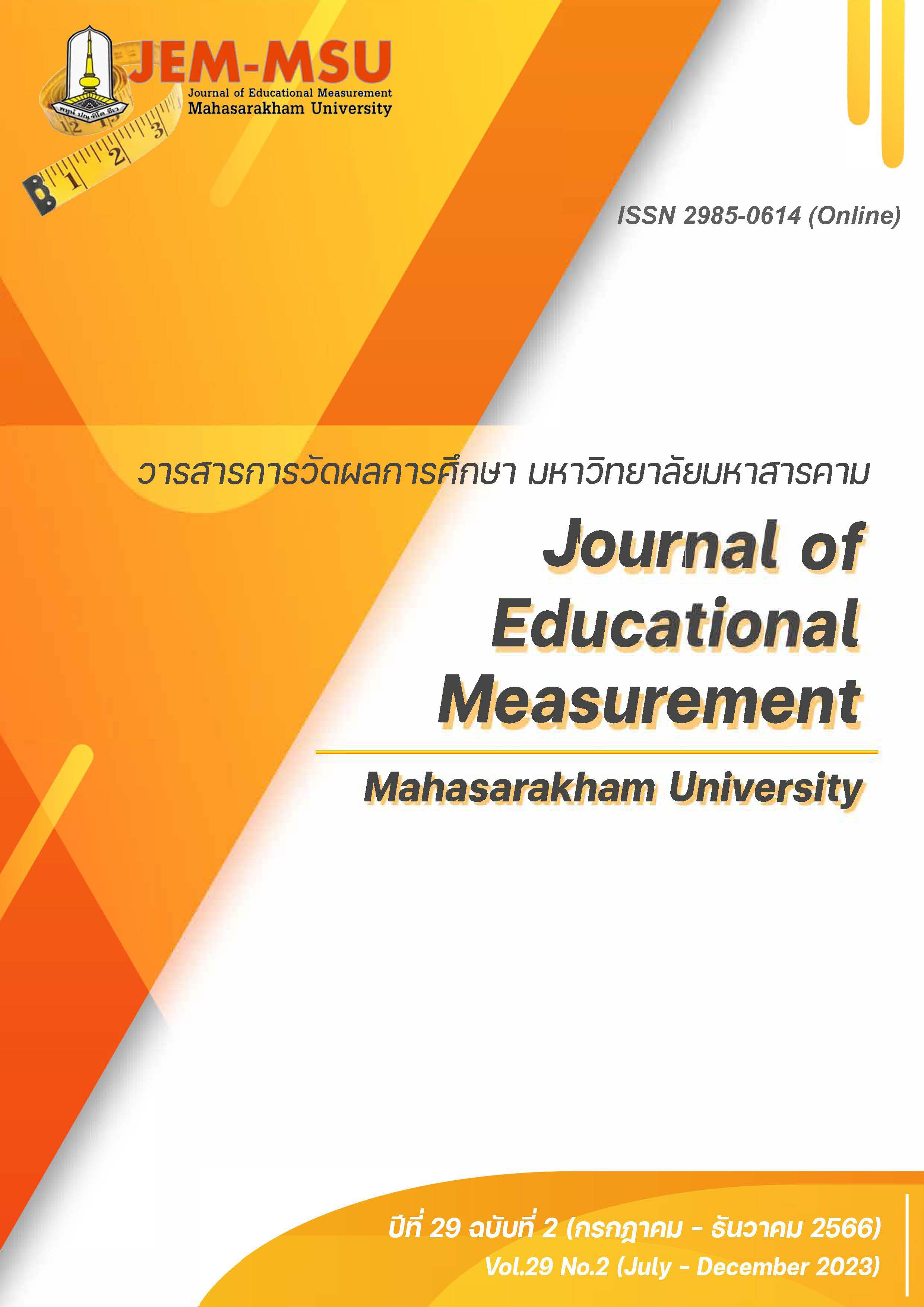Developing a Digital Empathy Scale to Measure and Assess Upper Secondary School Students in the 21St Century: An Application of Item Response Theory
Main Article Content
Abstract
This research aimed to (1) investigate and synthesize specific models and characteristics of a digital empathy scale to measure and assess upper secondary school students, (2) assess the needs of the specific models and characteristics of the digital empathy scale, and (3) study the psychometric properties of the digital empathy scale through application of the Item Response Theory. The study was divided into 3 stages. Stage 1 dealt with the study and synthesis of the model and characteristics of the digital empathy scale. Data were collected from a literature synthesis and interviews with 5 experts. Data analysis employed content analysis. Stage 2 dealt with assessment of needs of the models and characteristics of the digital empathy scale. The target group comprised 143 teachers and 755 students, totaling 898). A need assessment form was used in collecting the data and the modified Priority Needs Index (PNI) was used in prioritizing the needs. Stage 3 dealt with the study on psychometric properties of the digital empathy scale. The target group comprised 755 students. The digital empathy scale was used in collecting the data and the Grade Response Model (GRM) was used in analyzing the psychometric properties, namely: (1) content validity, (2) reliability, (3) item information function, (4) test information function, (5) slope, and (6) threshold, using the MULTILOG 7.03 program.
The findings revealed that:
1) The digital empathy comprised 5 components, namely: posting, sharing, commenting, responsive reactions, and other forms of assistance. The majority of the measure's format and specific characteristics were multiple-choice with multiple scoring.
2) Regarding the needs of the specific models and characteristics of the digital empathy scale, it was found that (1) the rating scale ranked first (PNImodified = 0.154), (2) the scale with no more than 20 items ranked first, (PNImodified = 0.150, and (3) the online format of scale ranked first (PNImodified = 0.144).
3) The psychometric properties of the 20-item digital empathy scale, on the whole, met the criteria, with content validity from Index of Item Objective Congruence (IOC) ranging from 0.67-1.00, total reliability of 0.922, item information function values ranging from 0.196 to 15.097 at ability (θ) ranging from -2.20 to 1.40, test information function value of 76.384 at ability (θ) -0.40, slope ranging from 0.87 to 7.72, and threshold values β1(SE) ranging from -3.37 to -0.77 and β2(SE) ranging from -0.41 to 1.63.
Article Details

This work is licensed under a Creative Commons Attribution-NonCommercial-NoDerivatives 4.0 International License.
The content and information contained in the published article in the Journal of Educational Measurement Mahasarakham University represent the opinions and responsibilities of the authors directly. The editorial board of the journal is not necessarily in agreement with or responsible for any of the content.
The articles, data, content, images, etc. that have been published in the Journal of Educational Measurement Mahasarakham University are copyrighted by the journal. If any individual or organization wishes to reproduce or perform any actions involving the entirety or any part of the content, they must obtain written permission from the Journal of Educational Measurement Mahasarakham University.
References
Ali, U.S., & Rijn, P.W. (2016). An evaluation of different statistical target for assembling parallel form in item response theory. Applied psychological measurement, 40(3), 163-179.
Amin, H., Malik, M.A., & Akkaya, B. (2021). Development and Validation of Digital Literacy Scale (DLS) and its Implication for Higher Education. International Journal of Distance Education and E- Learning (IJDEEL), 7(1), 24-43.
Aubry, A., & Bourdin, B. (2018). Short Forms of Wechsler Scales Assessing the Intellectually Gifted Children Using Simulation Data. Fronters in Psychology, 9, 1-12.
Butler-Henderson, B., & Crawford, J. (2020). A systematic review of online examinations: A pedagogical innovation for scalable authentication and integrity. Computers & Education, 159, 1-12.
Kamalludeen, R.M. (2020). Transitioning to the new normal in education. https:// www.thestar.com.
Taylor, J.E., & Deane, F.P. (2002). Development of a Short Form of the Test Anxiety Inventory. The Journal of General Psychology, 129(2), 127-136.
Buathong, S. (2017). Measurement and Assessment of Learning Skills in the 21st Century. Veridian E-Journal, Silpakorn University, 10(2), 1856-1867. (in Thai)
Intanon, S. (2019). Guidelines for Building Digital Empathy Skills for Children. https://web.facebook.com/thaiciviceducationcenter/posts/2470466963029640/ (in Thai)
Kaemkate, W. (2008). Research Methodology in Behavioral Sciences (2nd ed.). Chulalongkorn University Press. (in Thai)
Kantivong, A. (2017). Comparison of Item and Test Parallel Index Between Test Forms that Selected by Different Characteristics of Experts: Application of Formal Cultural Consensus Theory [Master’s thesis]. Chulalongkorn University. (in Thai)
Karnjanawasee, S. (2009). Classical Test Theory (6th ed.). Chulalongkorn University Press. (in Thai)
Karnjanawasee, S. (2012). Modern Test Theory (4th ed.). Chulalongkorn University Press. (in Thai)
Kittimongkolchai, S. (2019). Development of happiness learning scales of lower secondary school students in Bangkok metropolis [Master’s thesis]. Chulalongkorn University. (in Thai)
Office of Knowledge Management and Development. (2022). 8 Digital Citizenship Skills. https://www.okmd.or.th/okmd-kratooktomkit/4673/ (In Thai)
Panich, V. (2012). Ways to create learning for students in the 21st Century. Tathata Publication Company Limited. (In Thai)
Panpinit, S. (2011). Research techniques in social science. Witthayapat Company Limited. (In Thai)
Sabsombat, W. (2020). The situation during COVID-19, how should measurement and evaluation be done in the classroom?. https://web.facebook.com/permalink.php?story_fbid=882532388839994&id=100012497235631 (In Thai)
Secondary Education Service Area. (2015). Approaches for organizing learning skills in the 21st century that emphasize professional competency. https://secondary.obec.go.th/newweb/wp-content/uploads /2017/12/E-CEN21book.pdf (In Thai)
Sittisaman, S. (2020). Studying in the New Normal style and changing the way of evaluating. https://mgronline.com/qol/detail/9630000067379 (In Thai)
Thai Media Fund. (2021). Digital Empathy. https://www.thaimediafund.or.th/ (In Thai)
Wongwanich, S. (1999). A Synthesis of Techniques Used to Assess the Needs in the Thesis of Students in the Faculty of Education, Chulalongkorn University. Department of Educational Research and Psychology, Faculty of Education, Chulalongkorn University. (In Thai)


